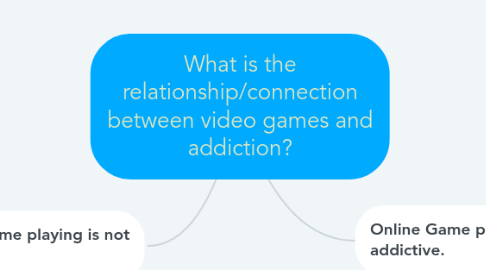
1. Online Game playing is not addictive.
1.1. Being addicted is a normal behavior that children or teenagers have that can waste a lot of time but isn’t related to anything like drugs or alcohol (Ferguson).
1.1.1. Some researchers even claim that these games are comparable to illegal drugs in terms of their influence on the brain, Ferguson says this is terribly misguided (Ferguson).
1.1.1.1. This talks about what Ferguson thinks about what researchers say to addictive video games.
1.1.2. Playing a video game or watching an amusing video on the internet causes roughly about as much dopamine to be released in your brain as eating a slice of pizza, Ferguson says that on its own, the fact that a pleasurable activity involves dopamine release tells us nothing else about it (Ferguson).
1.1.2.1. Ferguson says that the statement says nothing else other than dopamine.
1.2. Playing a video game a lot doesn't mean you are addicted, you might enjoy the game and want to play it all the time and you probably want to improve your skills at the game (Gray).
1.2.1. In some cases people engage in an activity not just because of their enjoyment of it, but also because it is an escape from something painful in their lives or is the only route available to them to satisfy basic psychological needs.
1.2.1.1. Says that people who like to play video games a lot just want to get away from crazy things in their life and video games are the only thing that can help them.
1.2.2. Gray says. video games, especially the newer, online multiplayer games,are extraordinarily challenging to players' mental powers and promote cognitive development.
1.2.2.1. Talks about what Gray thinks about addiction and video games (Gray).
1.3. Because someone only plays a game a lot because it may be enjoyable and fun to play, it doesn't mean that it is addictive.
1.4. Because if someone has a hard life and have many problems, video games may be one of the things that can help them with their psychological needs not because they're addicted.
2. Online Game playing can be addictive.
2.1. Children have access to violent video games and they can be addictive and affect their brain (Group Says).
2.1.1. Parents should be doing a better job protecting children from inappropriate games (Group Says).
2.1.1.1. Talks about how parents need to do better at keeping their children from playing games that have violence and may be addictive.
2.1.2. University of Oklahoma study suggests that playing violent video games "increases all the stress and aggression hormones," (Group Says).
2.1.2.1. Tells you what UO study found out about violent video games and what it can do to people.
2.2. online gaming is a fast growing form of addiction, especially among children and teenagers (Young).
2.2.1. According to the American Medical Association, up to 90 percent of American youngsters play video games and as many as 15 percent of them—more than 5 million children—may be addicted (Young).
2.2.1.1. This shows how many children are addicted to video games and how many are not but play video games. 15% of the 90% are addicted which is quite a bit from the total percent. This tells you how many kids and teenagers play video games 24/7 and how big of a problem it is.
2.2.2. Games often have trouble with social relationships and feel lonely as if they have never truly belonged (Young).
2.2.2.1. This talks about how gaming can affect social relationships, and what it can make people feel like.

